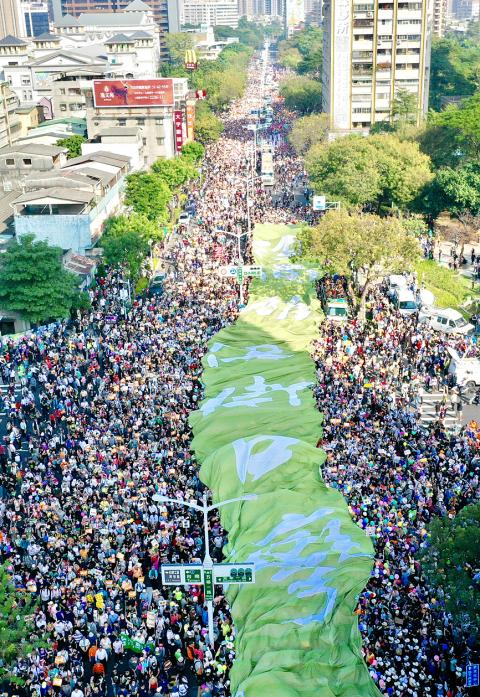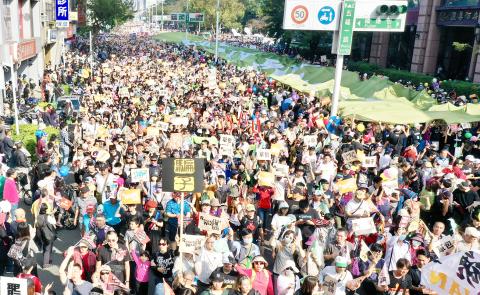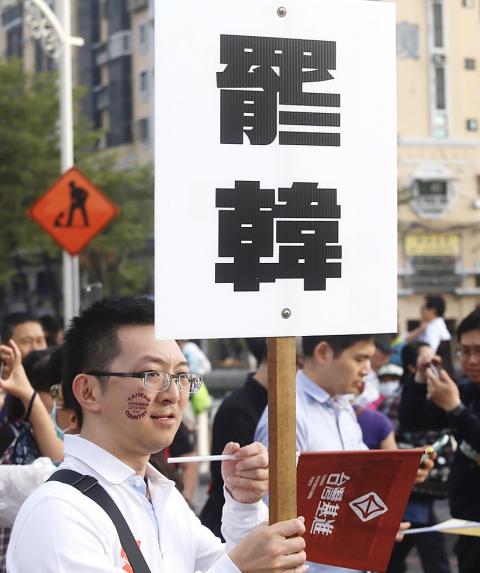Hundreds of thousands of people yesterday took to the streets to call for Kaohsiung Mayor Han Kuo-yu’s (韓國瑜) removal from office.
Shouting slogans such as “Recall Han Kuo-yu,” “Liberate Kaohsiung” and “Hang in there, Taiwan,” the group set off from the Kaohsiung Cultural Center at about 2pm and marched toward the waterfront in Yancheng District (鹽埕).
The protesters formed a human snake stretching nearly 1km along Wufu First Road, aerial images showed.

Photo: Peter Lo, Taipei Times
Some carried banners or wore clothing bearing text, such as one that criticized the city’s economic performance since the Chinese Nationalist Party (KMT) mayor took office, despite his promise to “make people rich.”
A demonstrator carried a poster admonishing Han for almost never being in the city, as he frequently travels to other parts of Taiwan for his presidential campaign.
Some protesters said it was their first time participating in a demonstration, adding that they “could no longer stand to see [Han] showing so little concern for his poor performance.”

Photo: CNA
Because of the scope of the demonstration, participants were divided into nine groups, each with their own leader, said social advocacy group Wecare Kaohsiung, which organized the march.
The groups included Wecare members led by founder Aaron Yin (尹立), the Taiwan Statebuilding Party’s Kaohsiung chapter led by chapter director Lee Hsin-han (李欣翰), a group supporting Hong Kong’s democracy movement led by Hong Kong student representative Tang Chun-yu (鄧俊儒) and a group led by Democratic Progressive Party Kaohsiung City Councilor Kang Yu-cheng (康裕成).
It is crucial to remember the sacrifices made to achieve democracy in Taiwan after the 40th anniversary of the Formosa Incident, Wecare said.

Photo: CNA
The incident, also known as the Kaohsiung Incident, refers to a crackdown by the then-KMT regime on a rally organized by Formosa Magazine and opposition politicians on Dec. 10, 1979, to mark Human Rights Day. It is considered an important turning point in the nation’s democratization.
“Thank you for being with us to the end of this demonstration, which is also the start of Han’s removal from office,” Yin told the crowd after taking the stage as the demonstration concluded in the evening.
Kaohsiung residents have been lied to every day for the past year, Yin said, adding that Han has taken advantage of the Civil Servants Election and Recall Act (公職人員選罷法), which protects elected officials from being recalled in their first year in office.
Han has used the immunity afforded to city council members to defame others, and used his constitutionally protected right of assembly to organize a counterprotest in the afternoon, Yin said.
“Today, 500,000 of us are standing here together, demonstrating our trust in democracy and our belief in our own ability to effect change,” he said.
Wecare would send a petition to the Central Election Commission on Thursday to call for Han to be recalled, he said.
At least one-10th of city residents would need to support the petition, and at least one-quarter of them would need to vote in favor of a recall for the process to succeed, he said.
Additional reporting by Hung Chen-hao, Fang Chih-hsien and Wang Shu-hsiu.

AGING: As of last month, people aged 65 or older accounted for 20.06 percent of the total population and the number of couples who got married fell by 18,685 from 2024 Taiwan has surpassed South Korea as the country least willing to have children, with an annual crude birthrate of 4.62 per 1,000 people, Ministry of the Interior data showed yesterday. The nation was previously ranked the second-lowest country in terms of total fertility rate, or the average number of children a woman has in her lifetime. However, South Korea’s fertility rate began to recover from 2023, with total fertility rate rising from 0.72 and estimated to reach 0.82 to 0.85 by last year, and the crude birthrate projected at 6.7 per 1,000 people. Japan’s crude birthrate was projected to fall below six,

US President Donald Trump in an interview with the New York Times published on Thursday said that “it’s up to” Chinese President Xi Jinping (習近平) what China does on Taiwan, but that he would be “very unhappy” with a change in the “status quo.” “He [Xi] considers it to be a part of China, and that’s up to him what he’s going to be doing, but I’ve expressed to him that I would be very unhappy if he did that, and I don’t think he’ll do that. I hope he doesn’t do that,” Trump said. Trump made the comments in the context

SELF-DEFENSE: Tokyo has accelerated its spending goal and its defense minister said the nation needs to discuss whether it should develop nuclear-powered submarines China is ramping up objections to what it sees as Japan’s desire to acquire nuclear weapons, despite Tokyo’s longstanding renunciation of such arms, deepening another fissure in the two neighbors’ increasingly tense ties. In what appears to be a concerted effort, China’s foreign and defense ministries issued statements on Thursday condemning alleged remilitarism efforts by Tokyo. The remarks came as two of the country’s top think tanks jointly issued a 29-page report framing actions by “right-wing forces” in Japan as posing a “serious threat” to world peace. While that report did not define “right-wing forces,” the Chinese Ministry of Foreign Affairs was

PREPAREDNESS: Given the difficulty of importing ammunition during wartime, the Ministry of National Defense said it would prioritize ‘coproduction’ partnerships A newly formed unit of the Marine Corps tasked with land-based security operations has recently replaced its aging, domestically produced rifles with more advanced, US-made M4A1 rifles, a source said yesterday. The unnamed source familiar with the matter said the First Security Battalion of the Marine Corps’ Air Defense and Base Guard Group has replaced its older T65K2 rifles, which have been in service since the late 1980s, with the newly received M4A1s. The source did not say exactly when the upgrade took place or how many M4A1s were issued to the battalion. The confirmation came after Chinese-language media reported